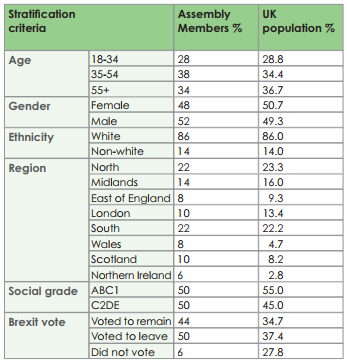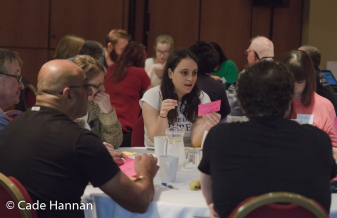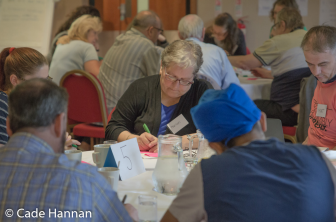United Kingdom
The Citizens’ Assembly on Brexit was held over two weekends in September 2017. It brought together 50 randomly selected citizens who reflected the diversity of the UK electorate. The Citizens’ Assembly on Brexit aims to provide much needed, robust public input into the Brexit process and show the value of informed and indepth public engagement on controversial areas of public policy.
The Citizens’ Assembly on Brexit was an opportunity for a diverse group of 50 UK voters with different viewpoints to learn about the issues of trade and migration from a variety of experts and politicians, deliberate with each other and come to recommendations on the form that Brexit should take. The Assembly was organised by an independent group of academics and civil society organisations and funded by the Economic and Social Research Council as part of its UK in a Changing Europe programme.
The citizens’ recommendations should inform government decision making, debates in parliament and broader public discussions over future relations between the UK and the EU. Government should also support the organisation of citizens’ assemblies on other critical policy issues.
50 randomly selected citizens
Recruiting the Assembly
The 50 members of the Citizens’ Assembly on Brexit were selected with the help of the polling company ICM. Five thousand people were approached through a survey, which gave their socio-economic characteristics and views on Brexit. Impressively, just over half were willing to participate in the Assembly, of whom over a thousand said they could attend both of the weekends.
The 50 Assembly Members were selected randomly from this pool to reflect the characteristics of the broader population, including their vote in the referendum. As the table indicates, the Members were well matched to the broader population. The Assembly contained more Members who voted Leave than Remain, but had a lower proportion of non-voters than the wider population.
Members were gifted an honorarium in recognition of the work they undertook.

The work of the Assembly
The first weekend focused on learning. Assembly Members were introduced to trade and migration issues as they relate to Brexit. Experts with different viewpoints on these issues made presentations and were questioned by Assembly Members.
The second weekend focused on deliberation and agreeing recommendations. Assembly Members heard from two MPs with divergent views and discussed and debated their own priorities for Brexit. They created guidelines for the UK government on what the UK’s trade and migration policies should be post-Brexit, then made more specific recommendations on future trade relations with the EU, on trade relations with non-EU countries and on migration policy. A summary of their recommendations and other findings can be found on the following pages.
The Assembly’s design and briefing materials and the selection of expert speakers were reviewed by an Advisory Board that included both Leave and Remain supporters, as well as experts in the presentation of neutral information on Brexit-related matters. Critical to the success of the Assembly was the professional facilitation led by the charity Involve. For further details and links, see the back page of this report.
Members’ views on the Assembly
Members’ support for the Assembly process can be judged through surveys that they filled in at the start and end of each weekend. Members were extremely positive about their experience, rating the overall event highly (on average, 4.6 out of 5). They were equally positive about the balance and fairness of the information they had received (4.4) and the range of diverse opinions they had heard (4.6). They felt that they had ample opportunity to express their views (4.6) and that their fellow participants had respected what they had to say, even when they didn’t agree with them (4.5).
Members believed that they had enough information to participate effectively (4.6) and that the Assembly had helped to clarify their views about Brexit (4.4). Their perception of their understanding of the issues of trade and immigration in relation to Brexit rose significantly across the two weekends (3.2 at the start of the first weekend to 4.2 at the end of the second).
Having completed two weekends of service, there was strong agreement amongst Members that citizens’ assemblies should be used more often to inform government decision-making (4.8).

Implications for the Brexit negotiations
Public opinion on the form that Brexit should take is not well informed. Citizens find it hard to access balanced information and debates are highly polarised. The Citizens’ Assembly on Brexit has gone further than any previous exercise in revealing what members of the public think about the options for Brexit when they have had the chance to learn about the issues, consider their own priorities, and work out the future policy direction they support. It has revealed a much more nuanced picture of public opinion than many have come to expect. The Assembly deserves to be listened to by those with political power and influence.
The recommendations of the Assembly run counter to the position advocated by various leading politicians who talk up the ‘no deal’ option if a favourable trade deal cannot be reached with the EU and who stress the over-riding importance of strong control over immigration.
The support for a ‘soft Brexit’ is not driven by the Assembly being full of those who voted Remain in the referendum.
Of the 50 members, 25 voted Leave in the referendum last year, while 22 voted Remain and 3 did not vote.
Nor was the Assembly given a biased picture of the options. The programme for the Assembly, the briefing papers, and the options were vetted by our diverse Advisory Board, and the speakers at both weekends represented a balance of views.
The results reflect the nuanced conclusions of a crosssection of the UK electorate who have dedicated two weekends to learning about and discussing the issues in depth and then come to carefully considered views. While legitimate disagreement over the future direction for Brexit will continue, their conclusions deserve to be taken seriously in current political debates.
The value of Citizen’s Assemblies
The Citizens’ Assembly on Brexit provides robust evidence that UK citizens are willing and able to learn about, deliberate and come to subtle and well-considered recommendations on highly complicated and controversial policy issues. If citizens can do this on an issue as divisive as
Brexit, this suggests strongly that citizens’ assemblies and other deliberative processes can be used on a range of challenging political and constitutional issues.
Decision makers draw heavily on opinion polls, but these rarely tell us the informed views of citizens. Such polls often encourage respondents to provide simple answers to complex questions, with headline results allowing one side or the other to claim support for their position. They tell us little of public attitudes on policy choices that involve trade-offs or where citizens need more information.

Deliberation can provide a richer and more nuanced account of public opinions that goes beyond the alluring but false simplicity of polls.
Citizens’ assemblies and other deliberative processes can strengthen representative democracy, not only by giving politicians insight into informed public perspectives on complex policy issues, but also by building trust in the political process. Random selection means that the wider public can be confident that Members are just like them and are not representing special interests. They can be confident that fellow citizens have spent time learning and deliberating with each other before making recommendations.
Citizens’ assemblies show that it is important to think carefully about how we design public participation.
Poorly designed processes can further alienate citizens from politics. Citizens’ assemblies are not the only way to engage citizens in a deliberative process, but they have proved their effectiveness.
We encourage governments, parliamentarians, councilors and others with political power to think carefully about how to design public participation so that engagement is meaningful for both citizens and decision makers. This will be good for government, for citizens and for the future of our democracy.
Organisers and funding
The Citizens’ Assembly on Brexit was organised by an independent consortium of universities and civil society organisations. The project was led by Dr Alan Renwick of the Constitution Unit at University College London in partnership with the Centre for the Study of Democracy at the University of Westminster, the University of Southampton, Involve and the Electoral Reform Society. The project was funded by the Economic and Social Research Council’s ‘UK in a Changing Europe’ programme.